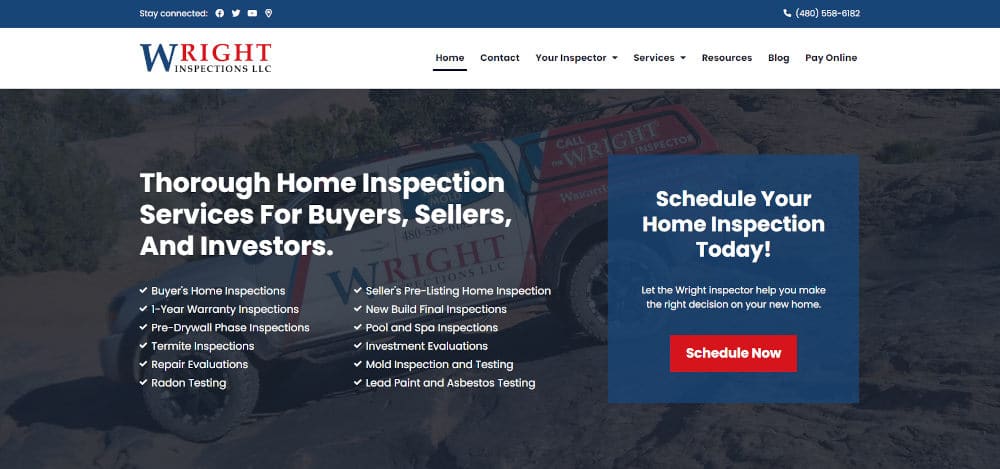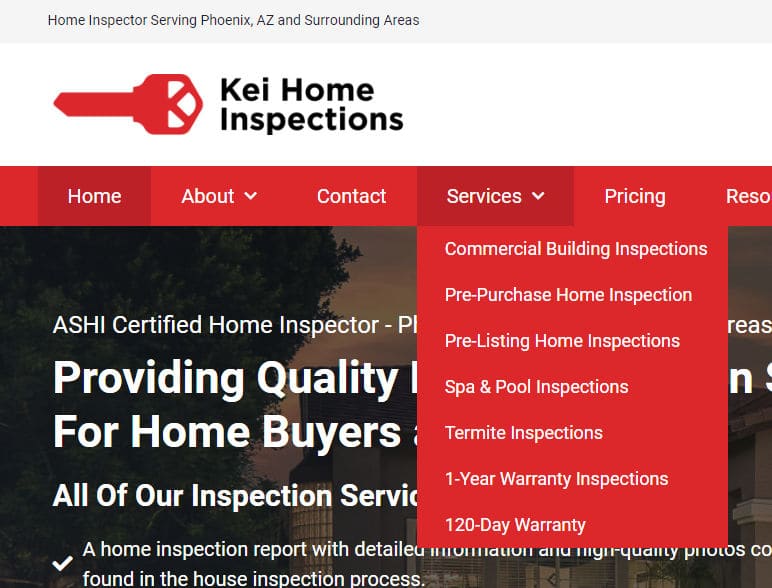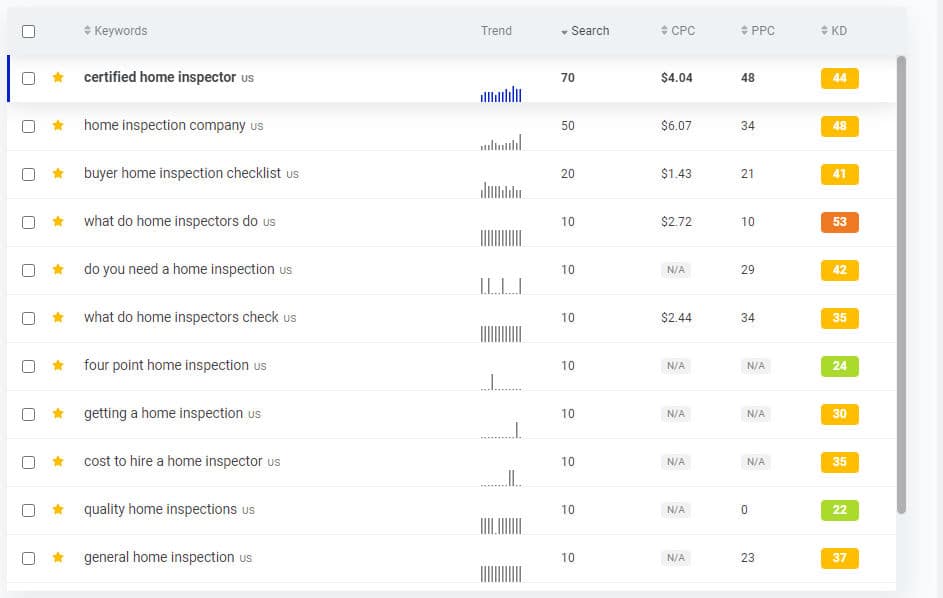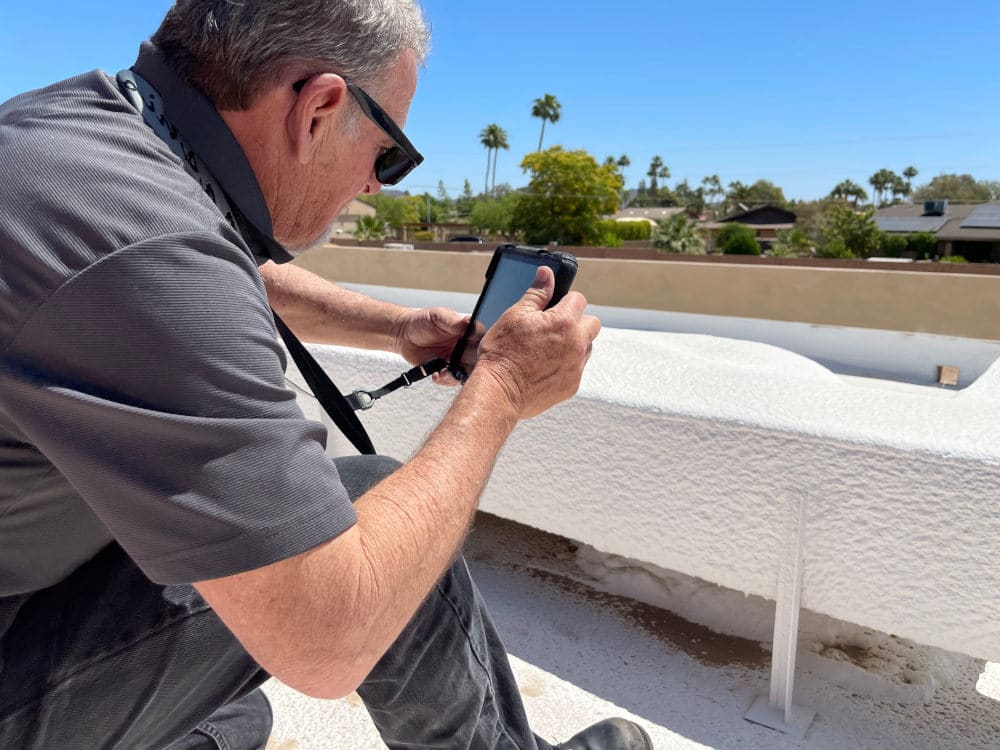As a certified home inspector, you serve an essential role in real estate transactions. However, having your name on a list of licensed professionals will not automatically send new clients your way. Even more than other small businesses, you need a website that will draw attention to your business and produce follow-up contacts.
This blog post is an effort to share some of our wisdom and experience about digital marketing strategies and how they apply to home inspector websites. Our goal is to provide you with basic, actionable steps to improve your digital presence.
As more businesses realize the importance of digital marketing, wise business owners will make an effort to set their marketing efforts apart from the crowd.
Why Home Inspection Businesses Depend on Digital Marketing
Most residential real estate transactions begin online. Homebuyers search websites to see what is available in their area. They may have virtually walked through dozens of homes before setting foot in a physical space with an agent. These potential clients will do the same with other parts of the real estate process, including finding a home inspector.
The nature of home buying also favors a strong digital marketing presence. Most people do not buy a new house frequently, so they will only look for home inspection services once every few years. This time gap means they do not have an existing relationship with an inspector. Instead, they will look for someone who can help them with their current home inspection needs.
Some of the factors that push a client toward a particular business include:
- Appearing at the top of online search results
- Having a website that streamlines client connection
- Providing clear contact information and answering common questions
- Presenting the business as professional, trustworthy, and reliable
- Including recent positive reviews from customers
A strong digital marketing presence is also helpful when developing relationships with real estate agencies. Agents work hard to project professionalism, and they will expect the businesses they recommend to do the same. If they are helping clients look for a home inspector, an excellent website makes it easier to share your business with confidence.
Understanding the Focus of Your Digital Presence
As you invest in your digital marketing strategy, it is easy to forget the point of all this effort. You are not in a competition to get the most views or likes. The purpose of your home inspector website is to have clients book your services. All your web pages, social media accounts, and directory listings should act as a funnel that leads to a direct phone contact or an online booking appointment. Keeping this goal firmly in mind will help you create online marketing resources with the greatest impact.
Stepping Away from Home Inspector Website Templates
As you start looking for examples of the best home inspector websites, you will inevitably find resources that offer templates for home inspector website design. These platforms can be helpful resources as you consider the basic material your site should offer. However, a template will give you a cookie-cutter result that looks like every other home inspector’s site. Templates may also bring some unexpected challenges such as:
- Unclear instructions or a confusing interface
- Limits on your creativity
- A lack of digital support leaves them open to malware
- Outdated structural code that corrupts the visual appearance and functionality of the site
Building a customized website will give your potential clients a unique experience that leads to follow-up contact.
Essential Tips for Your Home Inspection Website

We recommend that service providers take a fairly conservative approach to web design. The people who find your site are typically looking for the solution to a problem. Buying a home can be a stressful process. They want a home inspection service that will arrive on time and get the job done without making things more difficult. A no-nonsense web design that promotes an attitude of professionalism is a winning strategy.
Simplicity as a Service
Developers can add fantastic features to websites like unique graphics and animations. However, such additions can make the website slow to load, a factor in determining search rankings. They can also make the site feel less user-friendly.
People buying a home are already dealing with a complicated process. Your website should not add to the struggle. There are several user-centered home inspection website design questions you should ask when putting the page together.
- Can users find your contact information quickly?
- Are pictures properly scaled and formatted to streamline loading times?
- How many steps does it take to contact you?
- Is the important text readable?
- Do photos and graphics add value or clutter to the site?
Logos, Colors, and Branding
Choosing Your Color Scheme
Home inspector websites are not the best place for bright, neon color schemes. A simple color palette is a helpful way to provide a site that has an inviting sense of calm. Placing dark text on a light background makes it more readable. Online color palette tools can help you mix and match shades, but a professional web designer will have a better sense of color trends.
Designing a Logo
Your logo says something about your business. While you may be a child at heart, cute animals and other characters may not be the best choice for a home inspection website. Many homebuyers are looking to make a purchase that will enter them into a new stage of adulthood, and they will want a service provider who matches that feeling.
The Importance of Authentic Photos
Every aspect of your website should encourage viewers to want to work with you. Photos can deliver a positive impact on your site when used strategically. These images should not be stock photos that will simply take up space. Authentic photos that show you at work will make a stronger connection. Ideally, the images you choose will portray you doing something that a homeowner could not do on their own. Although it is an investment, working with a professional photographer will give you the best results.

Structuring Your Homepage
Just as people tend not to scroll too far when looking at search results, they will also make decisions based on their first impressions of your website. When you put together the landing page, you want to be certain that critical information appears on an average-sized screen without any extra work. If the first impression is intriguing, the user will be more likely to scroll down or navigate further. Some of the content that you want to have easily available will include:
- Your business name, logo, and tagline
- Contact information and hours of operation or a link to a Contact page
- Links that label all the special services you offer
- The general geographic area where you operate
If users like what they see, they will continue to scroll down. Further down the home page, you want to include content that might set you apart from competitors and improve your reputation like:
- Certifications and endorsements
- Customer reviews
- A slideshow of authentic images
- For search engine purposes, a list of the town names where you operate
Secondary Pages and Site Navigation

Most business websites involve several pages. You may want different pages to highlight your general home inspection and termite damage inspection services. The navigation setup should make finding each page simple. Using dropdown menus to gather related pages keeps your site clean.
Attention to your secondary service pages can also improve the likelihood that a client will find you online. Search engines like Google rate individual pages instead of the full website. If you offer specialized services like pool inspections or radon testing, you should optimize the related page for that category. For example, you should include content that links the service to your geographic area on every page.
Since the primary focus of your site is connecting to clients, your secondary pages should also serve that goal. The structure and content will guide potential clients to seek further contact. When the viewer clicks on a secondary page, it shows they have a growing interest in your company. In addition to a Contact link in the navigation bar, you will also want to include a link to the Contact page as part of a call to action in the text.
The Keys to Meaningful Content
Creating content for your website can be a challenge because there are two audiences to consider. The best content will meet the needs of both of them. First, there are the clients who are looking for your services. Human eyes need text that is clear and well-arranged. You want to present compelling information in a logical format. Since you are an inspector, people will expect you to pay attention to details. Misspelled words and other errors will not build confidence in your abilities.
The second audience is made of the search algorithms that rank your site in online results. Each search engine has a unique set of standards to determine where your site will land on a user’s list. While the formula an engine uses is not public, some of the factors that determine rankings include:
- Content quality: Search engines give more weight to unique, naturally-written language.
- Backlinks: When other sites link back to your site, it improves your authority as an expert.
- Structure: Relevant keywords in page headings have increased weight.
- Metadata: This backend information offers a virtual summary of the page for search engines. Your title tag and meta description require careful wording with relevant keywords.
Choosing the Right Keywords

When you perform an online search for an item or service, you start with general terms. For a home inspector website, users might type in a variety of search queries.
- Home inspection near me
- Home inspector near me
- Home inspection Dallas
- Home inspector termites
- Best home inspector
When the content of your home inspector website includes relevant keywords, it will impact your ranking in search results. The first step is to predict how people would search for your services. For local businesses, this will be a combination of a general business category with your geographic location. You will also want to include language about specific services like termite inspections or unique offerings like free estimates and same-day appointments.
Nobody Wants Spam!
Website designers are always looking for ways to improve the search engine rankings of their clients. They discovered they could trick early search engines by stringing keywords together in blocks. Such paragraphs came across as nonsense or spam to human readers while pushing websites up in search rankings.
Modern search engines check online content for natural language and syntax. Keyword stuffing and other spammy techniques will now penalize your site. Additionally, this type of manipulation will turn away clients looking for a serious professional.
SEO: Helping Clients Find Your Site
Search engine optimization is the art and science of developing websites that receive the best possible results from search engines. For web designers, SEO is a combination of structural and content-centered considerations. While the algorithms are secret and change periodically, employing standard best practices regarding content will help clients find your site.
- Place the main keyword in the title and primary heading.
- Place relevant keywords in section headings.
- Place keywords naturally in your content without sounding spammy.
- Use keywords in metadata, ALT picture descriptions, and file names.
- Use place names to clarify your service area and match queries.
Keeping Eyes on Your Site
The digital world changes rapidly, and content can quickly lose its relevance. Many businesses treat their websites like printed brochures. Once the information is online, they think the project is over. However, your home inspection website requires frequent attention for the best results.
The most important concern is that your information remains accurate. Phone numbers change and businesses move, but the website will not update automatically. Out-of-date or conflicting information can damage your search result ranking.
Fresh content also tends to keep your website relevant. Season-specific updates are a simple way to refresh your site and demonstrate that you are an active and attentive business.
Demonstrating Your Unique Value
Clients and search engines appreciate the signs of expertise. The online world measures relevance and authority by the number of external sites that link back to your site. There are a few strategies you can employ to develop these critical backlinks.
- Approach local professionals: You might agree to link to local real estate, construction companies, and contractors to create a bundle of links.
- Create exclusive content: A blog with industry-specific information can engage clients and also serve as a platform for developing links.
- Get listed on relevant service directories: Professional organizations like InterNACHI will provide a link for members.
Your Google Business Profile
While your website used to be your primary digital marketing tool, Google Business Profile has grown to be a significant resource. If you type your business name as a search query, your profile will show up on the right side of the search results on a desktop screen. If you have not yet claimed your profile, this action should be your first step. From there, you can add a variety of features that will attract clients.
- Contact information: It is essential that the information on your profile and website match.
- Videos and pictures: Authentic pictures are still a must!
- Client reviews
- Links to social media platforms
The Benefits of Working with Digital Marketing Professionals
Now that you understand some of the strategies behind home inspection web design, you can see why digital marketing is not a do-it-yourself project. You have worked hard to become a certified home inspector, but web design and search engine optimization require different skill sets.
If you are looking to launch, update, or improve your online presence, the digital marketing experts at BlueSoft can lead you through the process. When you contact us to schedule a free consultation, we will examine your current digital marketing materials and offer meaningful, actionable information to help you move forward.




